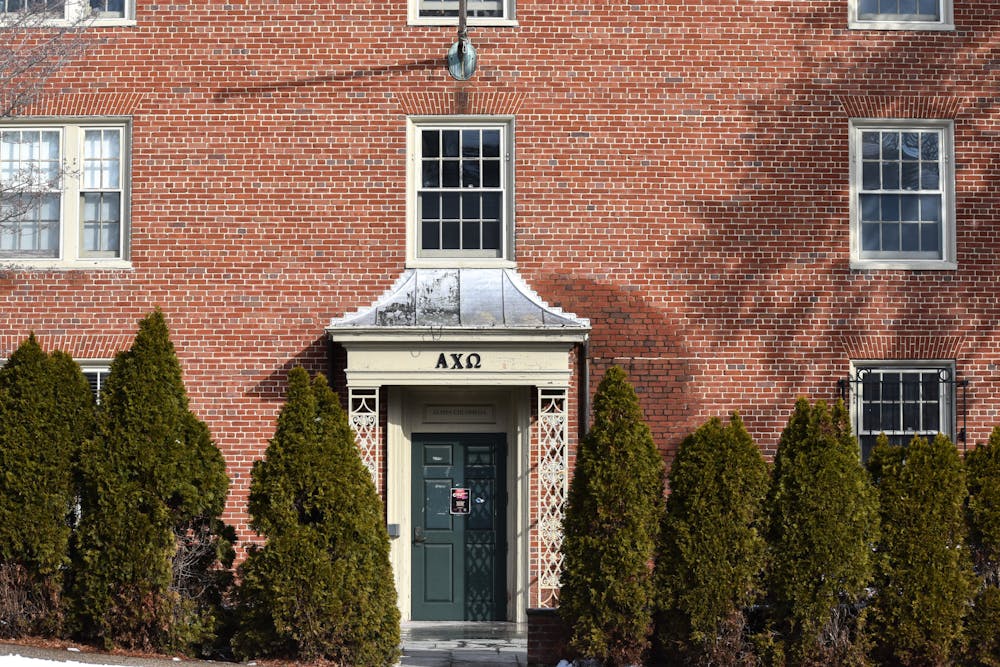Sarah Ridley ’26 stood in a room with 42 other women, waiting to open a brown paper bag with her name on it. On the count of three, Ridley pulled out a black T-shirt, emblazoned with “Delta Gamma” in a retro, hot-pink font — and underneath it, in smaller letters, “bid day.”
Ridley was one of the 69 students who rushed a sorority this semester, and one of the 43 students who accepted bids on Monday, Feb. 6. Out of the four nationally recognized sororities currently on campus, 13 new members joined Kappa Alpha Theta, 12 joined Kappa Delta, 11 joined Delta Gamma and seven joined Alpha Chi Omega.
2023’s numbers marked an increase from the year before — and the end of a four-year decline in the number of students participating in sorority rush. That number has dropped significantly since 2020 when 252 students attended the first round of recruitment. In 2021, 78 attended — and 2022 saw another decrease, with 53 attendees.
The number of potential new members — which sororities refer to as PNMs — differs from the number of students who register for rush itself. This year, 101 students registered, according to Terrance Sanders, director of program and theme houses in the Division of Campus Life.
Sixty-nine PNMs attended the first day of recruitment, which was held virtually due to cold weather and sub-zero wind chill. Attendees briefly spoke with representatives from all four houses over Zoom before ranking them in order of preference.
The number of PNMs dropped to 58 the next day for the “sisterhood and philanthropy” round, where each participant was invited back to a maximum of three houses to learn about each sorority’s events and philanthropic goals before ranking them again, Sanders said.
“Typically, the biggest drop in people is from day one to day two,” said Kappa Delta President Katherine Kim ’24. “A lot of people want to see if joining a sorority is right for them, so they sign up and go to day one, then realize it's not a good fit.”
Fifty-two returned on the third day for the “preference round,” where participants had longer conversations with current sorority members and heard testimonials to help them make a final ranking between two sororities, Sanders added. While 46 students indicated their preferences, three of them single-selected a sorority and did not receive bids. Forty-three participants ultimately returned for Bid Day.
Participants are required to initially rush all four sororities to maximize inclusivity, Kim said, adding that the process is designed so everyone who wants to join a sorority can receive a bid.
“The numbers have just not been consistent at all — recruitment numbers were in the 300s before my freshman year,” Kim said.
Kim cited the COVID-19 pandemic as a potential reason for the drop in interest. In 2020, in light of national social justice protests, college students across the country also created a number of “Abolish Greek Life” groups, which encouraged university administrators to ban Greek life organizations from their campuses, citing a lack of diversity and inclusivity in the organizations.
Efforts to bring registration back up at Brown are underway, with a primary focus on increasing inclusivity, Kim added.
“The women who participate in Greek life have changed drastically,” Kim said. “You had to be or act a certain way in a sorority, and that is no longer the case. The inclusivity has increased a lot.”
Ridley said that before coming to Brown, she never expected to join Greek life.
“One of the reasons I chose Brown is because Greek life has a relatively small presence,” she said, comparing it to universities in her home state of North Carolina. “It seemed like the majority of your social life. I didn't want to feel forced into something like that.”
Ridley said she found Brown’s rush culture “less intimidating” in comparison.
“It didn’t feel like anyone was telling me I had to rush,” she said. “It’s really easy to leave if you don’t want to do it. Low stakes, high reward.”
At Brown, students in a sorority have the time to pursue other clubs and interests, Kim said. In addition, Brown’s lack of calculated GPAs eliminates the stress of maintaining a certain academic standard in order to rush, she added.
Throughout rush, Ridley recalled asking herself if she should “drop,” describing the process as “exhausting” despite the low-pressure environment. She ultimately ended up choosing Delta Gamma because she “saw (herself) with the DG girls” as she went through the rush process.
“On bid day, I got to meet all the actives in DG,” Ridley said. “It was the first time I had really gotten to talk to them outside of recruitment, and it was really cool.”
Next year, Ridley said she plans to live with her sorority sisters at Goddard House on Wriston Quadrangle, and is looking forward to initiation.
Kim acknowledged the difficulties of rushing, encouraging students to try nonetheless.
“Something we tell every girl who’s rushing or going through recruitment is that you get out of it what you put into it,” Kim said. “I think I speak for all sororities in saying that we would all love for more people to just give it a shot.”

Anisha Kumar was the senior editor of community and standards of The Herald's 135th editorial board. She previously served as a section editor covering University Hall and international student life. She is a junior from Menlo Park, California concentrating in English and Political Science who loves speed-crosswording and rewatching sitcoms.





